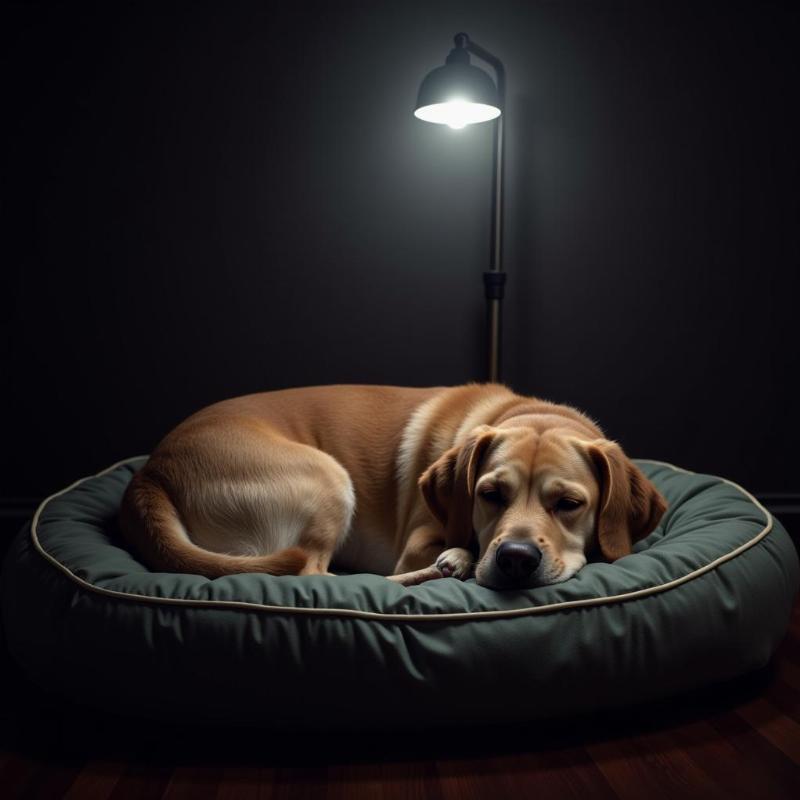Dealing with an older dog who suddenly starts barking at night can be frustrating for both you and your furry friend. While puppies are known for their nighttime vocalizations, barking in senior dogs often signals an underlying issue. This article will delve into the common reasons why older dogs bark at night, offer practical solutions, and provide valuable insights to help you restore peaceful nights for you and your aging companion.
Why is My Older Dog Barking at Night?
As dogs age, their physical and cognitive functions can change, leading to new behaviors like nighttime barking. Understanding the root cause is crucial to addressing the problem effectively. Is your dog barking due to discomfort, confusion, or something else entirely? Let’s explore some possibilities.
- Cognitive Decline: Canine cognitive dysfunction (CCD), similar to Alzheimer’s in humans, can cause confusion and anxiety, especially at night. Disorientation, changes in sleep-wake cycles, and increased vocalization are common symptoms.
- Pain or Discomfort: Arthritis, hip dysplasia, and other age-related ailments can cause pain, making your dog restless and more likely to bark at night.
- Loss of Senses: Decreased hearing or vision can make older dogs feel more vulnerable at night, leading to increased barking as a defense mechanism. Imagine not being able to see clearly in the dark – it can be quite unsettling!
- Anxiety or Fear: Separation anxiety, even in older dogs, can trigger nighttime barking. Changes in routine, new sounds, or even shadows can be frightening for a senior dog.
- Medical Conditions: Certain medical conditions, such as hyperthyroidism or Cushing’s disease, can cause increased anxiety and restlessness, leading to barking.
How to Stop Your Older Dog’s Nighttime Barking
Addressing nighttime barking requires a multifaceted approach. Here’s a step-by-step guide to help you tackle this issue:
- Veterinary Check-up: The first step is to rule out any underlying medical conditions. Your veterinarian can perform a thorough examination and recommend appropriate treatment.
- Manage Pain and Discomfort: If your dog is experiencing pain, medications, supplements, or therapies like acupuncture can help alleviate discomfort and reduce barking. A comfortable orthopedic bed can also make a world of difference.
- Create a Safe and Secure Environment: A consistent routine, a comfortable sleeping area, and a nightlight can help reduce anxiety and promote relaxation. Familiar scents, like a worn t-shirt, can also offer comfort.
- Mental Enrichment: Keeping your senior dog mentally stimulated throughout the day can help tire them out and reduce nighttime restlessness. Puzzle toys, short training sessions, and gentle walks are great options.
 Senior Dog Sleeping Peacefully
Senior Dog Sleeping Peacefully
- Behavior Modification: Positive reinforcement training can help address anxiety-based barking. Reward quiet behavior with treats and praise. Avoid scolding, as this can worsen anxiety.
- Medication: In some cases, your veterinarian may recommend medication to manage anxiety or other underlying conditions contributing to the barking.
- Sound Therapy: White noise machines or calming music can help mask disturbing sounds and create a more relaxing environment.
Addressing Cognitive Decline
If your dog’s nighttime barking is related to cognitive decline, consult your veterinarian about medications and supplements that may help. Maintaining a consistent routine, providing mental stimulation, and creating a predictable environment can also be beneficial.
When to Seek Professional Help
If your attempts to address the barking are unsuccessful, consider consulting a certified professional dog trainer or a veterinary behaviorist. They can provide tailored strategies to address your dog’s specific needs.
Conclusion
An older dog barking at night can be disruptive, but understanding the underlying causes and implementing appropriate solutions can help restore peace to your household. By addressing your dog’s physical and emotional needs, you can ensure they enjoy their golden years comfortably and quietly. Remember, patience and consistency are key.
FAQ
- Q: Why did my older dog suddenly start barking at night? A: Changes in behavior, including nighttime barking, can be due to a variety of factors, including cognitive decline, pain, anxiety, or medical conditions.
- Q: How can I tell if my dog’s barking is due to pain? A: Look for other signs of discomfort, such as limping, stiffness, changes in appetite, or reluctance to move.
- Q: Is it okay to ignore my dog’s barking? A: Ignoring the barking may not address the underlying issue and could even worsen the problem. It’s important to investigate the cause and implement appropriate solutions.
- Q: Can medications help with nighttime barking? A: Your veterinarian may recommend medications to manage anxiety, pain, or other underlying conditions contributing to the barking.
- Q: How can I create a calming environment for my senior dog? A: A comfortable bed, a consistent routine, a nightlight, and familiar scents can help create a safe and secure environment.
- Q: When should I consult a professional? A: If your attempts to address the barking are unsuccessful, consider consulting a certified professional dog trainer or a veterinary behaviorist.
- Q: What is canine cognitive dysfunction? A: CCD is a progressive neurodegenerative disease that affects older dogs, causing changes in behavior, memory, and learning abilities.
Related Articles
dog won't stop barking in crate at night
turning the mad dog into a genteel lord
Beautdogs.us is your premier destination for all things dog-related in the US. We offer expert advice on dog breeds, care, and products, catering to both new and experienced dog owners. Our comprehensive resources empower you to provide the best possible care for your furry friend. We’re passionate about helping you navigate the joys and challenges of dog ownership. For any questions, feel free to contact us via email at [email protected] or call us at +1 501-555-7529. Beautdogs.us is your trusted source for expert canine guidance.